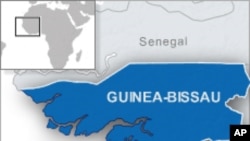Officials of the Economic Community of West African States (ECOWAS) and representatives from other international organizations are to meet this week to discuss ways to deal with political instability and drug trafficking in Guinea Bissau.
ECOWAS political director Abdel-Fatau Musah says he is hopeful the meeting will be able to find a solution to the crisis in the West African nation.
Guinea Bissau has suffered from increasing political instability and has become a trans-shipment point for South American cocaine headed to markets in Europe.
“We shall come up with a common report on our findings on this mission, which we will present to our principals,” Musah said. “Once we have achieved that, we [will] know that there is a roadmap that the entire international community to adhere to.
“ECOWAS is confident that this mission will provide a unique platform for everybody to come together listen to the people, and then come up with a single program of action aimed at bringing Guinea Bissau back from the brink and Guinea Bissau to be a responsible member of the community,” he said.
This is the first time that the ECOWAS, the African Union, the United Nations, the Community of Portuguese Speaking Countries (CPLP) and the European Union, have agreed to come up with a joint plan to address the challenges in Guinea Bissau.
“This is a rare opportunity for all these institutions to be together on the ground, just to find out what has actually been going on in that country,” said Musah, adding that he believed the meeting would address institutional and constitutional reform as well as the rampant drug trafficking in Guinea Bissau.
He also said the West African nation’s politicians often use the military to settle personal scores with opponents, which he says, leads to increased political instability.
Analysts say that since the latest government coup in April, there has not been a consensus on how best to help return Guinea Bissau to stability and democracy.
The analysts contend that ECOWAS and the CPLP disagree on the way forward to help restore constitutional order in the West African nation.
ECOWAS and its international partners agreed on the sidelines of the recent U.N. General Assembly to send a joint mission to Guinea Bissau to assess the security situation on the ground.
“This is to try to harmonize the position of these groups in the effort to return that country to constitutional rule,” said Musah. “We will be meeting the military, the transitional authority, civil society organizations, and the main political parties.”
Musah said “Guinea Bissau has proven to be about the weakest link as far as peace and security is concerned in the region.”
“You have a very disunited and unorganized political class that often uses the military to settle scores. You’ve got the military that has got the penchant to intervene in the political process in the country and you’ve got the issues of drug trafficking. We actually need to bring this to an end,” he concluded.
ECOWAS political director Abdel-Fatau Musah says he is hopeful the meeting will be able to find a solution to the crisis in the West African nation.
Guinea Bissau has suffered from increasing political instability and has become a trans-shipment point for South American cocaine headed to markets in Europe.
“We shall come up with a common report on our findings on this mission, which we will present to our principals,” Musah said. “Once we have achieved that, we [will] know that there is a roadmap that the entire international community to adhere to.
“ECOWAS is confident that this mission will provide a unique platform for everybody to come together listen to the people, and then come up with a single program of action aimed at bringing Guinea Bissau back from the brink and Guinea Bissau to be a responsible member of the community,” he said.
This is the first time that the ECOWAS, the African Union, the United Nations, the Community of Portuguese Speaking Countries (CPLP) and the European Union, have agreed to come up with a joint plan to address the challenges in Guinea Bissau.
“This is a rare opportunity for all these institutions to be together on the ground, just to find out what has actually been going on in that country,” said Musah, adding that he believed the meeting would address institutional and constitutional reform as well as the rampant drug trafficking in Guinea Bissau.
He also said the West African nation’s politicians often use the military to settle personal scores with opponents, which he says, leads to increased political instability.
Analysts say that since the latest government coup in April, there has not been a consensus on how best to help return Guinea Bissau to stability and democracy.
The analysts contend that ECOWAS and the CPLP disagree on the way forward to help restore constitutional order in the West African nation.
ECOWAS and its international partners agreed on the sidelines of the recent U.N. General Assembly to send a joint mission to Guinea Bissau to assess the security situation on the ground.
“This is to try to harmonize the position of these groups in the effort to return that country to constitutional rule,” said Musah. “We will be meeting the military, the transitional authority, civil society organizations, and the main political parties.”
Musah said “Guinea Bissau has proven to be about the weakest link as far as peace and security is concerned in the region.”
“You have a very disunited and unorganized political class that often uses the military to settle scores. You’ve got the military that has got the penchant to intervene in the political process in the country and you’ve got the issues of drug trafficking. We actually need to bring this to an end,” he concluded.





